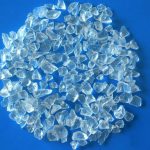Essential Mineral
Polyphosphates are used in mineral sequestration by municipal and local authority water systems around the world to control hard water issues such as iron and calcium in drinking water. Polyphosphates are an essential mineral in the human body and play a key role in blood coagulation. Produced and released by platelets they activate Factor XII which is essential for blood clot formation. On an industrial scale, polyphosphates are derived by mining minerals or through plant extraction.
 They are available in either liquid or solid form to fit different application needs. The solid form we use resembles clear beads or granules. These granules can be used in water treatment products such as filters and descalers.
They are available in either liquid or solid form to fit different application needs. The solid form we use resembles clear beads or granules. These granules can be used in water treatment products such as filters and descalers.
Silkwater Technologies use poly-phosphate crystals to treat and sequester calcium, aragonite and hard water minerals in our filter descaler products. Poly Phosphate used in water conditioning can eliminate the use of an ion exchange water softener in many cases, and is usually more economical and environmentally friendly, not needing to regenerate, producing no wasted water or brine and saving on salt purchases.
How It Works in Water treatment.
As untreated water passes through the water filter descaler, a small amount of poly-phosphate dissolves very slowly in the water stream and changes how the calcium and iron react in the water. Phosphates in general are used in water treatment systems to inhibit corrosion of the water mains and plumbing (iron, steel, galvanized, lead, copper), sequester nuisance metals in the water supply (iron, manganese, calcium, magnesium).
Benefits of using Poly-phosphates in Water:
- Prevent “red” staining (from iron) and “black” staining (from manganese) water
- Reduce soluble lead and copper in potable water
- Clean and dissolve precipitated mineral scale already existent in water distribution lines
- Prevent and/or retard scale formation (from mineral depositing) and corrosion (from low pH and/or dissimilar metals) in the water distribution system

